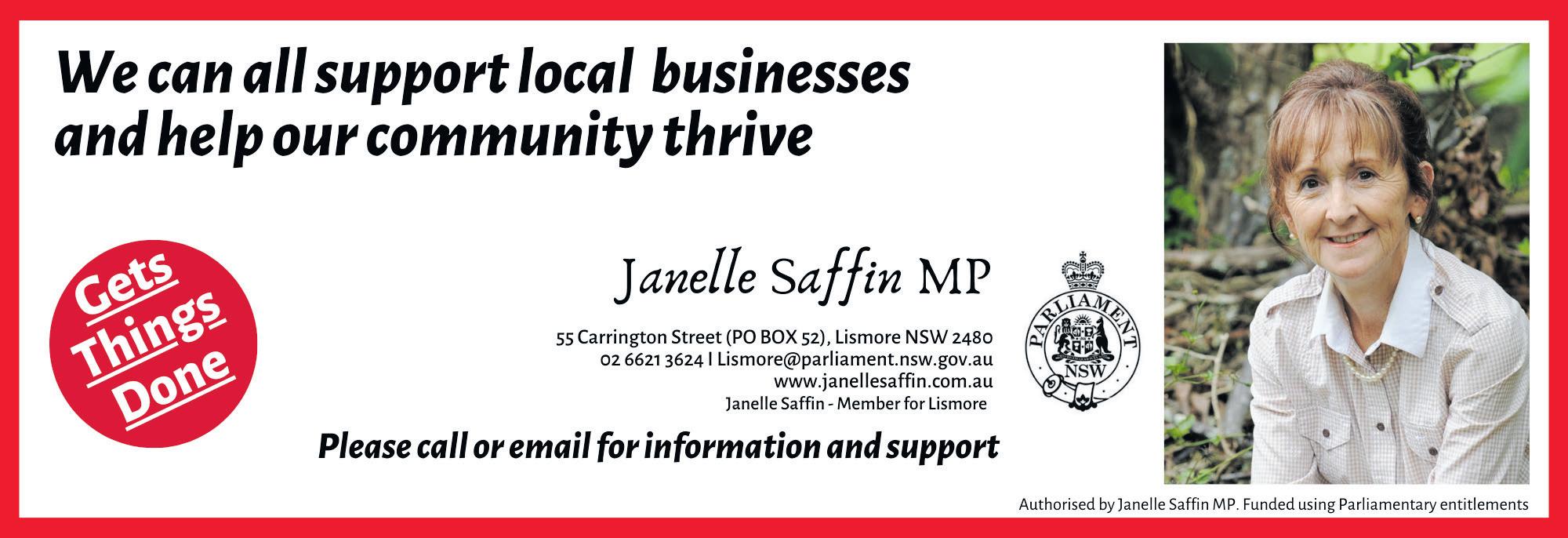
5 minute read
Community group wins twice at IPC
By Tim Howard
A Yamba community group, forced to lodge GIPA requests seeking information from Clarence Valley Council, has racked up two wins in the past two months.
In March and May this year, Yamba Community Action Network lodged GIPA request with Clarence Valley Council seeking access to information on two separate matters.

On both occasions the council failed to supply all information in the GIPA requests.
Yamba CAN secretary Lynne Cairns applied to the NSW Information and Privacy Commission, a independent statutory authority that administers legislation dealing with privacy and access to government held information in NSW, for a review of the council’s decisions.
In both cases the IPC found in favour of Yamba CAN and recommended the council review its decision.
In March Mrs Cairns said Yamba CAN applied to council for access to correspondence between the council and the Department of
Regional NSW about the Bushfire Local Economic Recovery grants for the Treelands Drive Community Centre project.

It also sought access to correspondence between the NSW Office of Local Government and council advising it on the status of a controversial rescission motion that came to council at its February 28 meeting.
In reply to the GIPA requests on April 28 the council decided it would supply partial information with some information redacted and that a crucial email Mayor Ian Tiley relied on to allow the rescission to proceed, was not in the council’s possession.
In early May Yamba CAN appealed to the IPC about the council’s decision
In the 14-page document advising the council to review its decision, the IPC made some telling findings.
It found there was evidence the council did have access to the email of February 27 to Cr Tiley.
The IPC review said: “The Applicant (Yamba CAN) provided evidence of the possible existence of the email to the review, in the form of an email exchange with the Mayor dated 9 May 2023. It is noted that one of the emails from the Mayor states:
“‘I confirm I was reading from an email from Mr Davies of OLG. This email was received on 27th February and his view was provided to all Councillors by the GM on the same day’.
The review was also critical of the search terms the council used to scour its database for the document.
“Overall, I am not satisfied that the searches of the Agency were reasonable in accordance with section 53 of the GIPA Act with respect to Item 3 of the Applicant’s GIPA request. Evidence has emerged that further information could exist, suggesting that further searches of electronic systems, email accounts and consultation with relevant areas of the Agency and staff may be warranted.”
The IPC also found the council’s charges for processing time for these searches was not reasonable.
In its decision dated August 17 the IPC also found the council had not met the public interest tests in the GIPA legislation and recommended the council “make a new decision by way of an internal review.”
Yamba CAN found itself writing to the IPC again in the May after the council again refused to supply information in response to a GIPA request.
The group had asked the council for statistics about the high turnover of employees at the council, the number of vacancies, the time taken to fill them and how many positions were filled by casuals or temporary staff.
The council’s reply that there was a public interest against full disclosure and that the council did not hold some of the information requested, did not satisfy the commissioner.
The commissioner in a 10-page finding said “on the information available, I am not satisfied that the Agency’s decisions under review are justified”. continued from page 3 services in exchange for the facility’s losses, when the projected loss to each rate payer has been calculated as $60 per rate payer.”
The commissioner found the the council had not met the clauses of GIPA act it relied on withholding information and on the basis of public interest.
And it found the council “had failed to demonstrate it conducted relevant inquiries and employed responsive keyword terms when carrying out electronic searches”.
Mrs Cairns said the these two IPC decisions were not the only times she been involved in reviews where the IPC recommended the council review it’s decisions.
“It makes you wonder how seriously they take the regulations around open and transparent decision making,” Mrs Cairns said.
She pointed to the fluctuation of costs and charges over the years at the NRLX, while the council’s fee of $1 a head had remained the same.
“Agents receive their percentage commission from the vendors and hence council’s recent move to the percentage commission as per the structure used by the agents with their clients,” she said.
Cr Humphries said it had also been necessary to for council to take control of the NRLX’s cattle handling.
“The requirements under the Work Health and Safety Act are specific, failing to follow the rules places people in the way of injury and death,” she said.
“It is essential for council to have the support of all users of the facility agree to accept the regulations.”
But Mr McCormack said the agents had concerns about the council’s claims RSPCA and police involvement at the NRLX.
He did not dispute there had been RSPCA inspectors called out, but said this had mostly been during the recent drought when cattle in poor condition arrived at the saleyards.
He said the only police matter he could think of was an issue at least four years ago and it was handled in a manner which reflected well on the agents’ management.
But Mr McCormack said there was a current RSPCA matter on foot involving the council not providing sufficient water for cattle arriving at the facility.
Cr Patrick Deegan posed a series of questions to the general manager about the EOI process, the council move to take over cattle handling, what sort of lease agreement the council would seek and the time frame to implement it.
Mr Macdonald did not provide many surprises in his answers.
He defended the council’s handling of the EOI and the aftermath, saying the council made “genuine attempts” to negotiate with the four local agents they accepted, but described it as one sided.
“We’ve been negotiating, we haven’t been getting much back,” he said.
Mr Macdonald said the changes in cattle handling, including using the Byron Bay-based company Spinifex, would not cost local people jobs.
“Just because they’re based somewhere else doesn’t mean that we’re not employing local people,” he said.
Mr Macdonald said the council would offer a long-term lease, which could mean teams of five up to 30 years, but did not provide many details about a timeline for reopening of the NRLX, but volunteered “three months” as a minimum time limit.

“I would expect that it can take up to three months from the time we go through a process of preparing less documents, putting it out the market,” he said.
“You’ve got to have it out to market for a period of time, then you need to assess that, which certainly, as suggested in the report, would recommend that procurement process being managed by an independent group. So we seek appropriate bodies to do that.
“And for us, that would certainly be involved to ensure that the best interests council and ratepayers is considered through that process.”
Cr Hayes queried Mr Macdonald on the $4 million surplus the NRLX account has in the bank, which Mr Bailey mentioned.
He asked if projects, such as repairing the sediment ponds, could erode that amount quickly.
Mr Macdonald said the council was chasing grant funding for that work, but said local government had been told it must fund depreciation of assets.
“We’ve been through it in the past period where we’ve relied on federal and state government funds and loans to fund it,” he said.
“The principles of how local government you know is heading and that government wants us to get to is that we have those money had the funds in reserves to invest in those renewals and new facilities.”
In his right of reply, Cr Hayes said the lease proposal was the only way break the stalemate between the council and agents.
“It is time to move on from the current situation to get sales back at the NRLX,” he said.
“And this recommendation is the first step in the right direction in achieving the best outcome for our entire community.”










